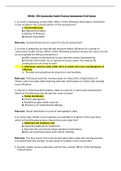Zusammenfassung
Ethics and the Future of Business complete summary (grade: 8.5)
- Kurs
- Hochschule
Complete summary (lectures, readings, papers) for the first part (exam part) of the Ethics and the Future of Business course in the Business Administration master program of the UvA. Includes all lectures, papers and readings. Grade: 8.5
[ Mehr anzeigen ]












